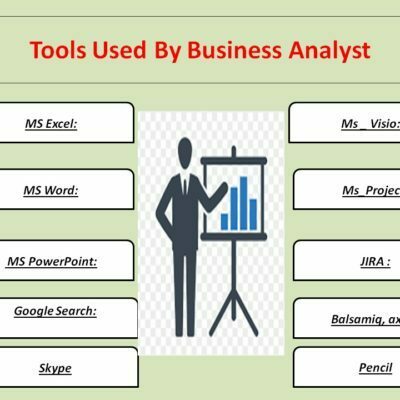Tools used by Business Analyst
Let us discuss about Tools used by Business Analyst
Tools Used by Business Analyst:
Business Analyst needs to use some tools during the project to make stake holders to understand the requirements clearly. Let us see some of the commonly and important Tools Used by Business Analyst:
A complicated BA role, Business Analyst needs to gather the requirements from the client and he needs to ensure that no requirement should be missed. He should prepare the specifications very carefully, because development team will understand the requirements based on the artifacts shared by the Business Analyst, if they understand in different way then development team will deliver what they understand as per the artifact, so it may not be as per client requirement, it leads to project failure.
Every organization is using different tools as per company’s requirement, here we will observe the commonly used to tools.
As a practicing business analyst, I have come across many business analysis tools.
I read so many articles and blogs in internet to understand what are the tools used by the Business Analyst to prove as a good Business Analyst. I found so many tools in internet, but practically it is very difficult to learn all the tools which I found in internet by the business analyst. Because A business analyst is one who deals with the requirements gathering, elicitation, analysis, and modeling on a day-to-day basis.
Hence, in this article, I focused on commonly Tools Used by Business Analyst which are used by almost all organizations.
Fundamentally, BusinessAnalyst need following types of business analysis tools:
- To track requirements
- To manage the requirements
- Design the requirements
- Describe requirements in certain detail
- Model requirements wherever feasible
- To collaborate with internal and external stake holders.
Here I am going to mention which are the tools I am using to meet my requirements, am not intended you to learn only these tools and am not promoting any tools.
MS Excel:
Mostly I use Excel to create flow charts and as per the client requirement, can use Excel to track the requirements and for requirement traceability matrix. We can create multiple things with using Excel like Wireframes, Flow charts and to manage the requirements. Excel contains several built-in mathematical and financial functions which will be useful in data analysis
- Pivot tables
- Examining the trends in data
- Sort and filter data
- Creating charts or graphs
MS Word:
Will use Ms_Word to prepare the multiple documents like FSD , BRD, Release Notes and User Manuals. Most of the stake holders are using the Ms-word to prepare multiple documents.
MS PowerPoint:
Will use power point for presentations. With using powerpoint we can easily explain to stake holders.
Google Search:
If you stuck somewhere and not able to understand what to do and how to do, then Google search will help us to get basic idea. If we need any templates related to documentation also we can get the same with using Google Search.
Skype
We can use skype to schedule meetings and we can explain easily via screen sharing to the stake holders. We can easily coordinate with internal and external stake holders with using skype.
Ms _ Visio:
Ms_Visio can be used to draw UML diagrams. We can easily identify with UML diagrams that which actor is doing which task. It will help developers to understand the requirement clearly.
- UML diagrams creation such as use case, sequence diagrams, and activity diagrams.
- To prepare process flow charts
- To create data models
- To generate architecture diagrams
Ms_Project:
Ms_Project can be used to track the requirements.
JIRA :
Jira can be used to track the requirements, issues, Change requests. Most of the organizations are using JIRA tool.
Balsamiq, axure and Pencil :
Balsamiq and axure can be used to create mockups to understand the requirement clearly. And easily we can explain to stake holders. Balsamiq Mockups helps business to work faster and smarter. Moreover, it allows projects to host online. In addition to that, it works as a collaboration tool between team and clients.
I hope this provided you the overview of Tools Used by Business Analyst.
Here I mentioned common tools used by Business Analyst, if you want to know more tools used by Business Analyst then you can browse on google.
Sample BA Document TemplatesSend download link to: |
Tools Used By Business Analyst : FAQ
What are the tools for business analysis?
Microsoft Office Suite. The following applications of Microsoft office suite come under the best business analysis tools list – …
Google Docs. …
Rational Requisite Pro. …
Balsamiq. …
SWOT. …
Pencil. …
Trello. …
SmartDraw.
What are analytics tools?
What are business analytics tools? Business analytics tools are types of application software that retrieve data from one or more business systems and combine it in a repository, such as a data warehouse, to be reviewed and analyzed

Business Analyst , Functional Consultant, Provide Training on Business Analysis and SDLC Methodologies.

